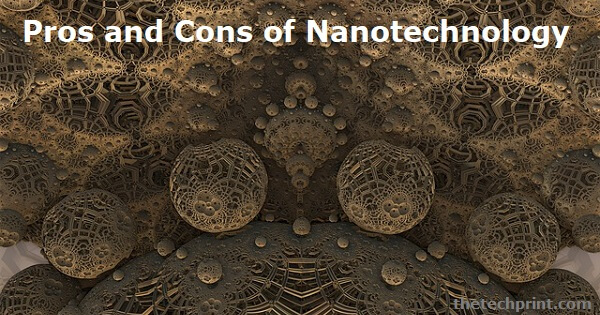Nanotechnology has become one of the exciting innovations in today's world. From working out at the cellular level in the healthcare sector to leaping into defense mechanisms and research, it's almost everywhere. However, technology is also not too far from the debate. There's always a question about how humans and other living beings will be affected due to it is advancements. Thus you can evaluate the pros and cons of nanotechnology based on several factors. Some of them are mentioned below.
To enumerate the advantages and disadvantages of nanotechnology, let us first run through the good things this technology brings:
Nanotechnology is already having a significant impact on medicine. Researchers use nanoparticles to target cancerous tumors, develop drug delivery systems, and improve medical imaging. Some nanoparticle-based therapies are multi-purpose; they can detect tumors and deliver medications for therapy.
Nanotechnology can be used to create materials with increased strength and durability. Nanomaterials are already being used in sporting goods, eyeglasses, and other products where a higher degree of durability is desired. This technology can also help to create buildings and infrastructure that are more resistant to earthquakes, high winds, and other natural disasters.
It can also be used to develop new methods for cleaning up the environment. For example, nanoparticles can be used more effectively to remove pollutants from water or air than traditional methods. Nanotechnology can also be used to develop improved batteries and fuel cells, which could decrease our reliance on fossil fuels.
Nanotechnology can be used to develop improved methods for food safety and quality control. For example, nanoparticles can be used to create sensors that can detect food spoilage or contamination. In addition, nanotechnology can be used to create packaging that is more effective at preserving food freshness and preventing contamination.
One of the potential pros of nanotechnology is that it could increase energy efficiency in various applications. Nanomaterials can create better insulation for buildings, leading to reduced heating and cooling costs. In addition, nanotechnology can be used to create more efficient solar cells and other renewable energy technologies.
Nanotechnology is already being used in several products and applications. Some examples include:
1. Stainless steel contains nano-sized particles of carbon that give it extra strength and resistance to corrosion.
2. Titanium dioxide nanoparticles are used as a UV filter in many sunscreen lotions.
3. Certain types of cloth are coated with nanoparticles that make them water and stain-resistant.
4. Many electronic devices, such as computers, TVs, and cell phones, contain nanomaterials.
5. Nanosensors are being developed to detect very small amounts of toxic chemicals or pollutants in the environment.
6. Researchers are also developing nano-sized robots that could be used for medical purposes, such as delivering drugs directly to cancer cells or repairing damaged tissues.
Of course, every coin has two sides. Along with the advantages, there are certain cons of nanotechnology as well:
One of the main cons of nanotechnology is that its long-term health effects are unknown. As nanoparticles can be inhaled, ingested, or absorbed through the skin, there is a potential for them to cause damage to cells or DNA. In addition, it is not yet known whether or not nanoparticles will accumulate in the body over time and what effect this could have on human health.
It could negatively impact the environment and human health if not used properly. For example, if nanoparticles are released into the environment, they could contaminate food or water supplies. In addition, if nanoparticles are not disposed of properly, they could accumulate in the environment and cause adverse effects.
Nanotechnology can have unprecedented harm to the economy. For example, if nanotechnology is used to create stronger and more durable materials, this could decrease the demand for traditional materials such as steel or concrete. In addition, if nanotechnology is used to create more efficient solar cells or other renewable energy technologies, this could lead to a decrease in demand for fossil fuels.
Another concern about nanotechnology is that it could be used to create new ways to spy on people or to create new weapons. For example, nanoparticles could be used to create surveillance devices undetectable to the naked eye. In addition, nanotechnology could be used to create new types of biological or chemical weapons.
However, advancements in nanotechnology, while beneficial in medicine, engineering, and material science fields, are pricey because the technology requires a lot of money to function, and the raw materials involved are also expensive. As a result, the overall purchase of technology for an average person becomes costly.
Conclusion
Nanotechnology is a fascinating field with a lot of potentials. However, some questions still need to be answered before they can be widely adopted. As researchers learn more about the effects of nanotechnology on humans and the environment, society will be able to decide better if this technology is right for them.

The uses of nanotechnology include increased agricultural yields and quality, better cosmetic items, targeted drug delivery, and sensor applications.
Nanoparticles can cross the blood-brain barrier, making them ideal for delivering medicines straight to the brain. This is an advantage since nanoparticles that deliver medications may damage the brain.
However, tiny particles of a certain size are not necessarily beneficial. Nanoparticles might be harmful to human health in some circumstances. To the point that even small particles that are deemed safe for humans would almost certainly prove hazardous when reduced to nanoparticle dimensions.
Toxicological studies have revealed that nanoparticles harm unicellular aquatic organisms and aquatic animals, such as fish and Daphnia. Protists are limited by carbon nanotubes, which cause harmful effects on rainbow trout's respiratory systems.